14 books about Comparison

Ancient Rhetorical Theories of Simile and Comparison
Marsh H. McCall Jr.
Harvard University Press, 1969
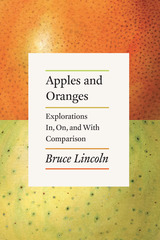
Apples and Oranges
Explorations In, On, and With Comparison
Bruce Lincoln
University of Chicago Press, 2018
Comparison is an indispensable intellectual operation that plays a crucial role in the formation of knowledge. Yet comparison often leads us to forego attention to nuance, detail, and context, perhaps leaving us bereft of an ethical obligation to take things correspondingly as they are. Examining the practice of comparison across the study of history, language, religion, and culture, distinguished scholar of religion Bruce Lincoln argues in Apples and Oranges for a comparatism of a more modest sort.
Lincoln presents critiques of recent attempts at grand comparison, and enlists numerous theoretical examples of how a more modest, cautious, and discriminating form of comparison might work and what it can accomplish. He does this through studies of shamans, werewolves, human sacrifices, apocalyptic prophecies, sacred kings, and surveys of materials as diverse and wide-ranging as Beowulf, Herodotus’s account of the Scythians, the Native American Ghost Dance, and the Spanish Civil War.
Ultimately, Lincoln argues that concentrating one's focus on a relatively small number of items that the researcher can compare closely, offering equal attention to relations of similarity and difference, not only grants dignity to all parties considered, it yields more reliable and more interesting—if less grandiose—results. Giving equal attention to the social, historical, and political contexts and subtexts of religious and literary texts also allows scholars not just to assess their content, but also to understand the forces, problems, and circumstances that motivated and shaped them.
Lincoln presents critiques of recent attempts at grand comparison, and enlists numerous theoretical examples of how a more modest, cautious, and discriminating form of comparison might work and what it can accomplish. He does this through studies of shamans, werewolves, human sacrifices, apocalyptic prophecies, sacred kings, and surveys of materials as diverse and wide-ranging as Beowulf, Herodotus’s account of the Scythians, the Native American Ghost Dance, and the Spanish Civil War.
Ultimately, Lincoln argues that concentrating one's focus on a relatively small number of items that the researcher can compare closely, offering equal attention to relations of similarity and difference, not only grants dignity to all parties considered, it yields more reliable and more interesting—if less grandiose—results. Giving equal attention to the social, historical, and political contexts and subtexts of religious and literary texts also allows scholars not just to assess their content, but also to understand the forces, problems, and circumstances that motivated and shaped them.
[more]
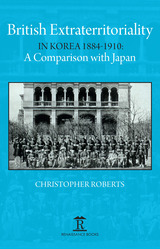
British Extraterritoriality in Korea 1884 – 1910
A Comparison with Japan
Christoph Roberts
Amsterdam University Press, 2021
Filling an important gap in extraterritoriality studies and in the history of Anglo-Korean relations, this benchmark study examines Britain’s exercise of extraterritorial rights in Korea from 1884 until Korea’s formal annexation by Japan in 1910. It shows how the treaty provisions—which provided for Britain’s ideal extra-territorial regime—were influenced by Britain’s considerably greater experience in Japan beginning in 1859. The caseload proved miniscule in the absence of any large British commercial or maritime presence. Nevertheless, it provides an insight into extra-territoriality’s operation outside major commercial centres and ports. Britain’s protection of Chinese interests in Korea in the aftermath of the Sino-Japanese War, 1894–1895 is also covered.
[more]
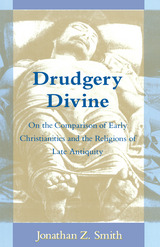
Drudgery Divine
On the Comparison of Early Christianities and the Religions of Late Antiquity
Jonathan Z. Smith
University of Chicago Press, 1990
In this major theoretical and methodological statement on the history of religions, Jonathan Z. Smith shows how convert apologetic agendas can dictate the course of comparative religious studies. As his example, Smith reviews four centuries of scholarship comparing early Christianities with religions of late Antiquity (especially the so-called mystery cults) and shows how this scholarship has been based upon an underlying Protestant-Catholic polemic. The result is a devastating critique of traditional New Testament scholarship, a redescription of early Christianities as religious traditions amenable to comparison, and a milestone in Smith's controversial approach to comparative religious studies.
"An important book, and certainly one of the most significant in the career of Jonathan Z. Smith, whom one may venture to call the greatest pathologist in the history of religions. As in many precedent cases, Smith follows a standard procedure: he carefully selects his victim, and then dissects with artistic finesse and unequaled acumen. The operation is always necessary, and a deconstructor of Smith's caliber is hard to find."—Ioan P. Coulianu, Journal of Religion
"An important book, and certainly one of the most significant in the career of Jonathan Z. Smith, whom one may venture to call the greatest pathologist in the history of religions. As in many precedent cases, Smith follows a standard procedure: he carefully selects his victim, and then dissects with artistic finesse and unequaled acumen. The operation is always necessary, and a deconstructor of Smith's caliber is hard to find."—Ioan P. Coulianu, Journal of Religion
[more]
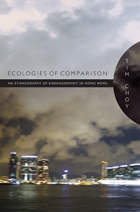
Ecologies of Comparison
An Ethnography of Endangerment in Hong Kong
Tim Choy
Duke University Press, 2011
A rich ethnography of ecopolitics in Hong Kong in the late 1990s, as the region shifted to Chinese sovereignty, Ecologies of Comparison describes how ecological concepts of uniqueness and scale resonated among environmentalists, including those seeking to preserve a species of white dolphin, to protect an aging fishing village from redevelopment, and to legitimize air quality as an object of political and medical concern. During his research, Tim Choy became increasingly interested in the power of the notion of specificity. While documenting the expert and lay production of Hong Kong’s biological, cultural, and political specificities, he began comparing the logics and narrative forms that made different types of specificity—such as species, culture, locality, and state autonomy—possible and meaningful. He came to understand these logics and forms as “ecologies of comparison,” conceptual practices through which an event or form of life comes to matter in environmentalist and other political terms. Choy’s ethnography is about environmentalism, Hong Kong, and the ways that we think about environmentalism in Hong Kong and other places. It is also about how politics, freedom, culture, expertise, and other concepts figure in comparison-based knowledge practices.
[more]

The Education of Nations
A Comparison in Historical Perspective, Revised Edition
Robert Ulich
Harvard University Press
In this far-ranging, incisive study, Robert Ulich analyzes the various forces that have molded the educational systems and common intellectual heritage of Western nations. Ulich has added to this revised edition of his work an important chapter describing new developments in educational policy.
[more]
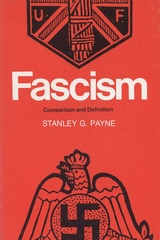
Fascism
Comparison and Definition
Stanley G. Payne
University of Wisconsin Press, 1983
“An impressive review of reputed fascist movements, at once setting them apart from other authoritarian nationalist organizations and bringing them together within a qualified generic category. Running throughout the volume, and valuable to readers at every level, is a careful critique of the major debates that divide scholars on this most unintelligible ‘ism’ of them all. Payne precisely defines issues, cites the best literature in the major European languages, and offers with moderation and intelligence his own conclusions on the question.”—Gilbert Allardyce, American Historical Review
[more]
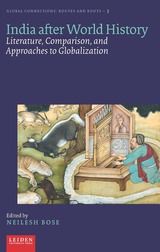
India after World History
Literature, Comparison, and Approaches to Globalization
Neilesh Bose
Amsterdam University Press, 2022
In the twenty-first century, terms such as globalization, global, and world function as key words at the cusp of new frontiers in both historical writing and literary criticism. Practitioners of these disciplines may appear to be long time intimate lovers when seen from pre and early modern time periods, only to divorce with the coming of Anglophone world history in the twenty-first century. In recent years, works such as Martin Puchner’s The Written World, Maya Jasanoff’s The Dawn Watch, or the three novels that encompass Amitav Ghosh’s Ibis Trilogy, have rekindled a variant of history and literature’s embrace in a global register. This book probes recent scholarship concerning reflections on global history and world literature in the wake of these developments, with a primary focus on India as a site of extensive theoretical and empirical advances in both disciplinary locations. Inclusive of reflections on the meeting points of these disciplines as well as original research in areas such as Neo-Platonism in world history, histories of violence, and literary histories exploring indentured labor and capitalist transformation, the book offers reflections on conceptual advances in the study of globalization by placing global history and world literature in conversation.
[more]
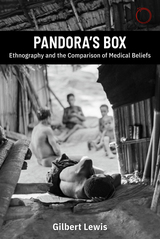
Pandora's Box
Ethnography and the Comparison of Medical Beliefs: The 1979 Lewis Henry Morgan Lectures
Gilbert Lewis
HAU, 2020
In this book, written between 1979 and 2020, Gilbert Lewis distills a lifetime of insights he garnered as a medical anthropologist. He asks: How do different cultures' beliefs about illness influence patients' abilities to heal? Despite the advances of Western medicine, what can it learn from non-Western societies that consider sickness and curing to be as much a matter of social relationships as biological states? What problems arise when one set of therapeutic practices displaces another?
Lewis compares Indigenous medical beliefs in New Guinea in 1968, when villagers were largely self-reliant, and in 1983, after they became dependent on Western medicine. He then widens his comparative scope by turning to West Africa and discussing a therapeutic community run by a prophet who heals the ill through confession and long-term residential care.
Pandora's Box began life with the prestigious Lewis Henry Morgan Lectures that Gilbert Lewis delivered in 1979 at the University of Rochester. He expanded them with materials gathered over the next forty years, completing the manuscript a few weeks before his death. Engagingly written, this book will inspire anthropologists, medical professionals, students, and curious readers to look with new eyes at current crises in world health.
Lewis compares Indigenous medical beliefs in New Guinea in 1968, when villagers were largely self-reliant, and in 1983, after they became dependent on Western medicine. He then widens his comparative scope by turning to West Africa and discussing a therapeutic community run by a prophet who heals the ill through confession and long-term residential care.
Pandora's Box began life with the prestigious Lewis Henry Morgan Lectures that Gilbert Lewis delivered in 1979 at the University of Rochester. He expanded them with materials gathered over the next forty years, completing the manuscript a few weeks before his death. Engagingly written, this book will inspire anthropologists, medical professionals, students, and curious readers to look with new eyes at current crises in world health.
[more]
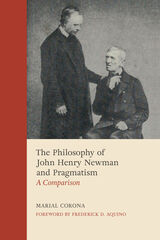
The Philosophy of John Henry Newman and Pragmatism
A Comparison
Marial Corona
Catholic University of America Press, 2023
In recent years, interest in John Henry Newman as a philosopher has gained momentum. This work places his philosophical insights in conversation with philosophers from the pragmatic tradition, particularly with C. S. Peirce, the classical pragmatists, and those who have followed their line, and shows several lines of concurrence. It argues that Newman overcame the modern philosophy of his time by reconnecting to the Aristotelian tradition in a very similar way to how Peirce did it fifty years later and the new pragmatists a century after.
Without claiming that Newman is a pragmatist philosopher, pragmatism is used as a foil, or point of access, to delve into Newman’s philosophy and bring forth the richness of his thought while placing him in the canon of philosophy. This approach deepens the understanding of his philosophical contributions and widens their reach to circles that have previously not engaged with him. Further, this study provides a means to understand pragmatism’s resources from a seldom-used vantage point and perhaps appreciate its fruitfulness in a new way.
Much emphasis is placed in Newman’s texts that refer to his search for and commitment to the truth. The particular nuances of his thought that are brought to light showcase the effective intellectual resources that his writings contain. Newman does not provide ready-made answers to today’s questions, but the way he analyzes and engages with the quandaries of his time can point us to creative and fruitful ways of engaging with those of our times.
[more]
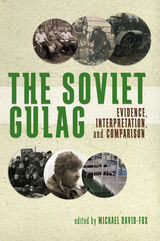
The Soviet Gulag
Evidence, Interpretation, and Comparison
Michael David-Fox
University of Pittsburgh Press, 2016
Before the collapse of the Soviet Union and the subsequent archival revolution, Aleksandr Solzhenitsyn’s famous “literary investigation” The Gulag Archipelago was the most authoritative overview of the Stalinist system of camps. But modern research is developing a much more thorough and nuanced understanding of the Gulag. There is a greater awareness of the wide variety of camps, many not isolated in far-off Siberia; prisoners often intermingled with local populations. The forced labor system was not completely distinct from the “free” labor of ordinary Soviet citizens, as convicts and non-prisoners often worked side-by-side. Nor was the Gulag unique when viewed in a global historical context.
Still, the scale and scope of the Soviet Gulag was unprecedented. Intrinsic to Stalinist modernization, the Gulag was tasked with the construction of massive public works, scientific and engineering projects, and such mundane work as road repairs. Along with the collectivization of agriculture, the Soviet economy (including its military exertions in World War II) was in large part dependent on compulsory labor. The camp system took on an outsized economic significance, and the vast numbers of people taken in by zealous secret police were meant to fulfill material, not just political, goals. While the Soviet system lacked the explicitly dedicated extermination camps of its Nazi counterpart, it did systematically extract work from inmates to the verge of death then cynically “released” them to reduce officially reported mortality rates.
In an original turn, the book offers a detailed consideration of the Gulag in the context of the similar camps and systems of internment. Chapters are devoted to the juxtaposition of nineteenth-century British concentration camps in Africa and India, the Tsarist-era system of exile in Siberia, Chinese and North Korean reeducation camps, the post-Soviet penal system in the Russian Federation, and of course the infamous camp system of Nazi Germany. This not only reveals the close relatives, antecedents, and descendants of the Soviet Gulag—it shines a light on a frighteningly widespread feature of late modernity.
Overall, The Soviet Gulag offers fascinating new interpretations of the interrelationship and importance of the Gulag to the larger Soviet political and economic system, and how they were in fact parts of the same entity.
Still, the scale and scope of the Soviet Gulag was unprecedented. Intrinsic to Stalinist modernization, the Gulag was tasked with the construction of massive public works, scientific and engineering projects, and such mundane work as road repairs. Along with the collectivization of agriculture, the Soviet economy (including its military exertions in World War II) was in large part dependent on compulsory labor. The camp system took on an outsized economic significance, and the vast numbers of people taken in by zealous secret police were meant to fulfill material, not just political, goals. While the Soviet system lacked the explicitly dedicated extermination camps of its Nazi counterpart, it did systematically extract work from inmates to the verge of death then cynically “released” them to reduce officially reported mortality rates.
In an original turn, the book offers a detailed consideration of the Gulag in the context of the similar camps and systems of internment. Chapters are devoted to the juxtaposition of nineteenth-century British concentration camps in Africa and India, the Tsarist-era system of exile in Siberia, Chinese and North Korean reeducation camps, the post-Soviet penal system in the Russian Federation, and of course the infamous camp system of Nazi Germany. This not only reveals the close relatives, antecedents, and descendants of the Soviet Gulag—it shines a light on a frighteningly widespread feature of late modernity.
Overall, The Soviet Gulag offers fascinating new interpretations of the interrelationship and importance of the Gulag to the larger Soviet political and economic system, and how they were in fact parts of the same entity.
[more]
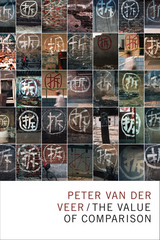
The Value of Comparison
Peter van der Veer
Duke University Press, 2016
In The Value of Comparison Peter van der Veer makes a compelling case for using comparative approaches in the study of society and for the need to resist the simplified civilization narratives popular in public discourse and some social theory. He takes the quantitative social sciences and the broad social theories they rely on to task for their inability to question Western cultural presuppositions, demonstrating that anthropology's comparative approach provides a better means to understand societies. This capacity stems from anthropology's engagement with diversity, its fragmentary approach to studying social life, and its ability to translate difference between cultures. Through essays on topics as varied as iconoclasm, urban poverty, Muslim immigration, and social exclusion van der Veer highlights the ways that studying the particular and the unique allows for gaining a deeper knowledge of the whole without resorting to simple generalizations that elide and marginalize difference.
[more]
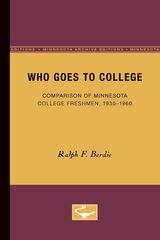
Who Goes to College
Comparison of Minnesota College Freshmen, 1930-1960
Ralph Berdie
University of Minnesota Press, 1962
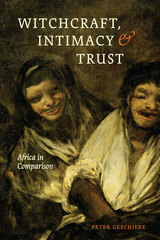
Witchcraft, Intimacy, and Trust
Africa in Comparison
Peter Geschiere
University of Chicago Press, 2013
In Dante’s Inferno, the lowest circle of Hell is reserved for traitors, those who betrayed their closest companions. In a wide range of literatures and mythologies such intimate aggression is a source of ultimate terror, and in Witchcraft, Intimacy, and Trust, Peter Geschiere masterfully sketches it as a central ember at the core of human relationships, one brutally revealed in the practice of witchcraft. Examining witchcraft in its variety of forms throughout the globe, he shows how this often misunderstood practice is deeply structured by intimacy and the powers it affords. In doing so, he offers not only a comprehensive look at contemporary witchcraft but also a fresh—if troubling—new way to think about intimacy itself.
Geschiere begins in the forests of southeast Cameroon with the Maka, who fear “witchcraft of the house” above all else. Drawing a variety of local conceptions of intimacy into a global arc, he tracks notions of the home and family—and witchcraft’s transgression of them—throughout Africa, Europe, Brazil, and Oceania, showing that witchcraft provides powerful ways of addressing issues that are crucial to social relationships. Indeed, by uncovering the link between intimacy and witchcraft in so many parts of the world, he paints a provocative picture of human sociality that scrutinizes some of the most prevalent views held by contemporary social science.
One of the few books to situate witchcraft in a global context, Witchcraft, Intimacy, and Trust is at once a theoretical tour de force and an empirically rich and lucid take on a difficult-to-understand spiritual practice and the private spaces throughout the world it so greatly affects.
Geschiere begins in the forests of southeast Cameroon with the Maka, who fear “witchcraft of the house” above all else. Drawing a variety of local conceptions of intimacy into a global arc, he tracks notions of the home and family—and witchcraft’s transgression of them—throughout Africa, Europe, Brazil, and Oceania, showing that witchcraft provides powerful ways of addressing issues that are crucial to social relationships. Indeed, by uncovering the link between intimacy and witchcraft in so many parts of the world, he paints a provocative picture of human sociality that scrutinizes some of the most prevalent views held by contemporary social science.
One of the few books to situate witchcraft in a global context, Witchcraft, Intimacy, and Trust is at once a theoretical tour de force and an empirically rich and lucid take on a difficult-to-understand spiritual practice and the private spaces throughout the world it so greatly affects.
[more]
READERS
Browse our collection.
PUBLISHERS
See BiblioVault's publisher services.
STUDENT SERVICES
Files for college accessibility offices.
UChicago Accessibility Resources
home | accessibility | search | about | contact us
BiblioVault ® 2001 - 2024
The University of Chicago Press









